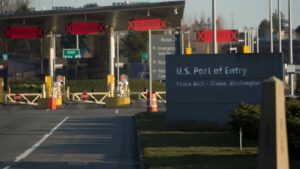
VANCOUVER – Two B.C. residents who’ve made cross-border day trips to Washington State are now stuck in quarantine due to confusion over an app.
On Tuesday, Rick Minchin decided to take advantage of the new rule permitting Canadians to make cross-border trips of less than 72 hours without producing a negative PCR test.
Minchin, along with his wife, Terry, spent four hours in Blaine, before heading back to New Westminster, B.C., through the Pacific Highway border crossing.
When they pulled up to the border, the guard asked them if they had registered their day trip on the ArriveCAN app, which they had not. Use of the app became mandatory for entry into Canada for all travellers back in February.
Minchin said the guard told him that was a violation of the border requirements and ordered them to quarantine at home for two weeks.
“We tried to discuss with him: ‘Can we turn around? Is there anything else we can do?’ He basically said no,” explained Minchin.
On Thursday, Surrey resident Martin Turo decided to pick up a package in Blaine. Turo registered his trip on the ArriveCAN app, but the 70-year-old, who admits he is not tech-savvy, could not figure out how to upload his vaccine details.
Instead, he brought a physical copy of his vaccine information with him to present to the border guard.
“I brought that vaccine passport with me and (the border guard) didn’t even want to look at it,” said Turo.
Like Minchin, Turo was ordered to quarantine for 14 days, despite having two COVID-19 vaccinations plus a booster shot, and only spending 30 minutes south of the border.
“It feels like I’m being punished for not being able to navigate the ArriveCAN app,” he said.
Border officers told CTV News many Canadians have failed to register their trips on the app, since the relaxed rules for short trips kicked in on Nov. 30. Some travellers have been permitted to turn around, download the app and return to the border, but not everyone has been given that chance.
“Subjectivity is the hallmark of arriving at the Canadian border,” said Ryan Neely, a Vancouver-based immigration lawyer.
“It’s more an officer’s decision if they want to send you away and give you time to fill out that app.”
Minchin already had the ArriveCAN app on his phone and had previously used it for a trip to the U.S., but said he didn’t know it was required for day trips.
After emailing the Public Health Agency of Canada (PHAC) on Tuesday, asking for his quarantine to be rescinded, he received a response on Thursday, but it made no mention of his quarantine order. Instead, PHAC said he’d been selected for random COVID-19 testing at the border, which he claimed was never communicated to him by the border guard. Travellers who are chosen for random testing are not required to isolate, unless their tests come back positive.
Unsure of whether he’s required to quarantine, Minchin has once again followed up with PHAC for clarity, but he’s not confident he’ll get any answers.
“It does not appear (PHAC) know what’s going on, and it does not appear there’s anyone in the bureaucracy you can contact who is able to make a decision.”
British Columbians planning a trip to the U.S., regardless of how long they will be out of the country, or of vaccination status, must submit mandatory information including proof of vaccination (if applicable) within 72 hours before their entry into Canada. Travellers without smartphones or data can access the accessible web-based version at Canada.ca/ArriveCAN.
Travellers must show their ArriveCAN receipt to the Canadian officials at the border. This can be accessed via the mobile app, a screenshot or print out of their receipt, or their emailed receipt.




 Driving Naari Programme launched in Chandigarh
Driving Naari Programme launched in Chandigarh






























